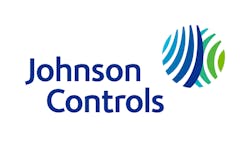Johnson Controls’ Emission Reduction Targets Approved
CORK, IRELAND — Johnson Controls, the global leader for smart, healthy and sustainable buildings, today announced the Science Based Targets Initiative (SBTi) has approved its ambitious emissions reductions targets.
The targets covering greenhouse gas (GHG) emissions from Johnson Controls’ operations (scopes 1 and 2) are consistent with reductions required to keep warming to 1.5°C, the most ambitious goal of the Paris Agreement. Johnson Controls’ target for emissions from its value chain (scope 3) also meet the SBTi’s criteria for ambitious value chain goals, and are therefore in line with current industry best practice.
“Independent validation of our new targets is confirmation that we are in line with the most aggressive pathway to avoiding the worst effects of climate change,” said George Oliver, chairman and CEO, Johnson Controls. “We recently announced new environmental, social and governance (ESG) commitments, along with a net zero carbon pledge. The SBTi validation further proves the strength of our core strategy – to reduce carbon emissions and support a healthy, more sustainable planet. This is at the heart of our business.”
SBTi is a partnership between CDP, the United Nations Global Compact, World Resources Institute and the World Wide Fund for Nature. It independently assesses corporate sustainability claims and uses science-based targets to show companies how much and how quickly they need to reduce their GHG emissions in order to be consistent with keeping global warming below the most dangerous levels.
As part of its environmental sustainability commitments, Johnson Controls aims to slash operational emissions by 55 percent and reduce customers' emissions by 16 percent in absolute terms before 2030. Its OpenBlue platform for optimizing buildings sustainability will be central to fulfilling these goals and ultimately creating an environment for healthy people, healthy places and a healthy planet.
“Improving the health of our planet is a matter of urgency, which we are recognizing through our commitments. We are making positive change within our own corporation and believe we are uniquely positioned to help customers and suppliers achieve their sustainability goals,” said Katie McGinty, vice president & chief sustainability, government and regulatory affairs officer at Johnson Controls.
Johnson Controls is taking significant steps to drastically improve its environmental impact while empowering customers and future generations to consume less energy, conserve resources, and identify pathways to achieving healthy, net zero carbon communities. Powered by artificial intelligence and machine learning, Johnson Controls OpenBlue platform facilitates real-time monitoring, benchmarking and analysis of energy consumption and demand. It also enables customers to produce indoor environmental quality reports to help achieve healthy building and wellness certifications.
The company recently joined the Business Ambition for 1.5°C campaign – an urgent call to action from a global coalition of UN agencies, business and industry leaders – and is a signatory to The Climate Pledge, an initiative of business leaders co-founded by Amazon and Global Optimism. Signatories to the pledge commit to reaching net zero carbon emissions by 2040 – ten years ahead of the goal set out in the United Nations’ Paris Climate Agreement.
As a leader in the buildings space for more than 135 years, Johnson Controls has been a pioneer in sustainability and is ranked in the top 12 percent of climate leadership companies globally by CDP and was recently named to the World’s Most Ethical Companies® Honoree List and one of Corporate Knights’ global 100 most Sustainable Companies. Recently George Oliver has been named Chairman of the Business Roundtable Energy and Environment Committee where he is driving policies that preserve the environment and maximize sustainable energy options.
To read more about Johnson Controls commitment to sustainability, please visit:
https://www.johnsoncontrols.com/corporate-sustainability/environment
